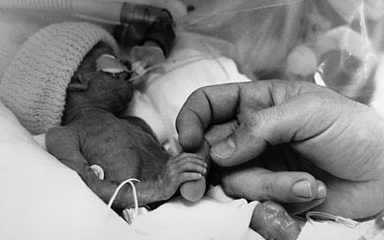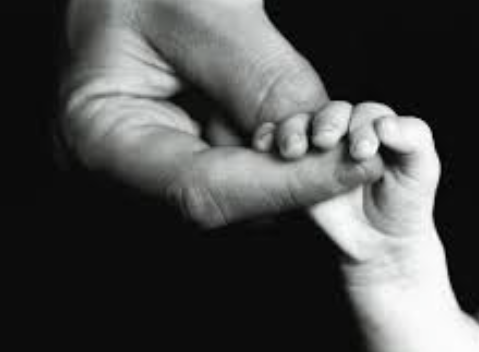my soul wanted you
Last week, one of the doctors at the hospital was working late at night when a nurse’s aide came running in from the women’s ward. “A woman’s intestines are under her bed!” he yelled.
A 20-something-year-old woman had come in for emergency surgery on a large abdominal hernia. A few hours later, she had gotten out of the bed, saying she had to go to the bathroom, and squatted over a bedpan, and then climbed back into bed.
When the nurse’s aide came by a few minutes later, he thought her intestines had fallen into the bed pan.
When the doctor came over to see, she found that it was not the woman’s intestines, but a 27-week-old baby, still inside an intact amniotic sac with the placenta lying neatly beside it.
The doctor pulled the amniotic sac open with her bare hands, and started yelling orders at the staff. She resuscitated the baby on the floor for half an hour and then they moved the baby to an incubator.
The staff was in awe.
It was a miracle. ‘Intestines under the bed’ turned into a tiny life now living in an incubator in our pediatrics ward.
The staff was also relieved.
Because we see death here all the time. I mean, all.the.time. So finding unexpected (not to mention, totally adorable) life was like a cool breeze hitting your face on an arid day.

Two days later, I showed up at the hospital at 7 a.m. to work my next 30 hour on-call shift. As I was setting down my things at the nurse’s station, a nurse came around the corner from pediatrics. “The baby's crashing,” she said breathlessly.
I ran over to find our two pediatricians at the bedside of the 27 week-old baby, with the side of the incubator flipped open. Humid, 98-degree air was spilling into the room. It was like standing in an oven.
The baby’s heart rate and respirations had dropped, so the doctors were using the Ambu bag to give her oxygen.
They bagged her for a while, and then the baby’s heart stopped.
I started giving her chest compressions. With adult chest compressions, you put one hand over the other and use the heel of your hand to compress the sternum, using your upper body as leverage. This baby was so tiny, I could do chest compressions with one finger.
Blood started coming out of the baby’s lungs. Then the doctors put an ultrasound probe on her head. She was bleeding into her brain, too. She was so premature, her blood vessels hadn't fully formed, and they were rupturing. And there was nothing we could do about it.
While the pediatricians intubated her and suctioned her, I kept doing compressions. We used the Ambu bag to breathe for her. We gave her multiple doses of epinephrine to restart her heart.
I have never seen a baby coded so well for so long.
And yet.
The baby didn’t make it. We never got a heartbeat back.
One of the pediatricians asked the family if they wanted to see the baby, and the family said no. They just wanted to be able to take her home and bury her — which is what Togolese people do when anyone dies. There are no coffins or cemeteries. Dead bodies are wrapped in cardboard or fabric and buried in hand-dug graves.
We covered the baby in her mom’s shawl, and handed her to her father, who stood silently in the middle of the room holding the bundle that was smaller than his hands.

The whole time I was doing chest compressions on that baby, I was asking God why.
I have seen more children die in the past six weeks than I ever wanted to see in my lifetime — babies who die of respiratory arrest at birth, kids who die of cerebral malaria and intractable seizures. Last week, we lost a 5 month-old baby to tetanus. TETANUS. For the love of everything holy.
I’ve done chest compressions on these little ones, sometimes for hours, wondering why God allowed them to be in this world if he was just going to let them die so quickly after they arrived.
And I’ve asked God why I exist if there’s nothing I can do to fix the horrendously high mortality rate for children under five — not only in Togo, but around the world. Why did God create me to be here in a world with problems I can’t solve and issues I can’t change?
As I was standing at the incubator helping to code the neonate, I thought back to my trip to Israel in June.
At the Jordan River, where Jesus was baptized, there’s a long wall that has the verse from Mark 1:11 printed in at least 100 languages.
In English, the verse reads, “….and a voice came down from heaven; ‘Thou art my son. In thee I am well pleased.’”
But our tour guide took us to the Hebrew translation of the verse and told us that the verse literally translates, “You are my son. My soul wanted you.”
My soul wanted you.
I cannot make sense of the kids who die so young in Togo.
And sometimes, I can’t make sense of my own life — with all of my imperfections and inadequacies, I have no idea why God put my soul into this body and let me live and breathe here in this world...and then, some day, pass on to the next.
No matter how hard I try, I don't think I will ever fully understand the reason for my existence — or anyone else’s. And I will never understand why some souls are here for a century, and others come and go in a matter of hours.
Maybe the only answer we ever get for why God created our souls to exist on this side of eternity and the next is our Father’s gentle hand resting on our shoulder like a dove, his deep voice whispering in our ear, “You are my child. My soul wanted you.”
My soul wanted you.